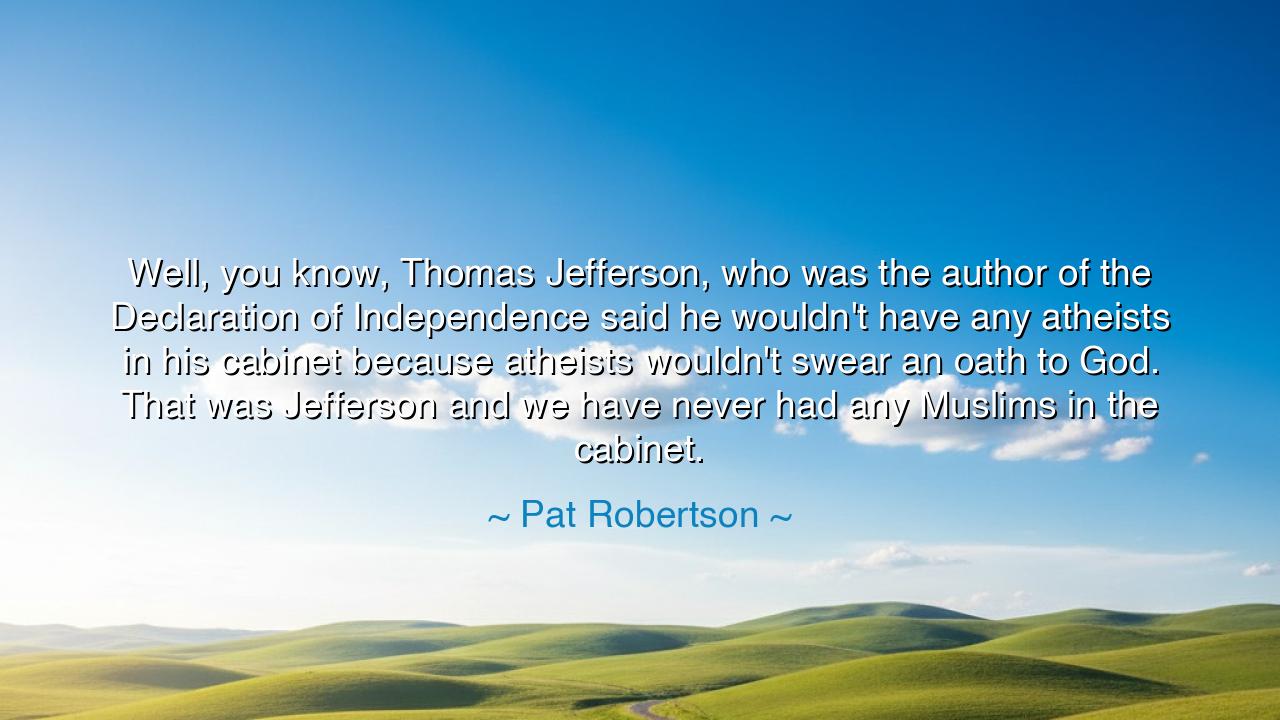
Well, you know, Thomas Jefferson, who was the author of the
Well, you know, Thomas Jefferson, who was the author of the Declaration of Independence said he wouldn't have any atheists in his cabinet because atheists wouldn't swear an oath to God. That was Jefferson and we have never had any Muslims in the cabinet.






When Pat Robertson spoke the words, “Well, you know, Thomas Jefferson, who was the author of the Declaration of Independence said he wouldn't have any atheists in his cabinet because atheists wouldn't swear an oath to God. That was Jefferson and we have never had any Muslims in the cabinet,” he was doing more than recounting a piece of history — he was exposing a conflict as old as faith itself, the struggle between belief and governance, between the divine order and the civic order. His words touch the timeless question: what role should faith play in the halls of power? It is a question that nations, empires, and peoples have wrestled with since the dawn of civilization.
The origin of this quote lies in Robertson’s reflections on the American tradition and its deep entanglement with religion. As a Christian minister and political commentator, he looked back to Thomas Jefferson, one of the architects of liberty, a man who spoke of unalienable rights endowed by the Creator. Jefferson, though often portrayed as a man of reason and enlightenment, still lived in an age where oaths were sacred and God was the guarantor of truth. To swear an oath was not a mere formality; it was to bind one’s soul before the divine. Thus, to Jefferson — and to many of his time — an atheist, who denied the very foundation of that divine witness, could not be trusted in matters of state.
Robertson’s words, however, are not merely a historical reflection; they are a window into the enduring tension between inclusion and tradition. He notes that America, though built upon freedom of belief, has never seen a Muslim rise to the highest levels of its executive governance — not because the Constitution forbade it, but because the spirit of the nation has long been shaped by a Christian ethos. His tone suggests both observation and challenge: the unspoken question — can a nation born of one faith truly embrace all faiths, or does it forever carry the imprint of its founders’ creed?
This struggle is not unique to America. Throughout history, nations have wrestled with how to balance divine allegiance and civic equality. The ancient Romans, too, demanded loyalty to their gods as proof of loyalty to the state; those who refused — including early Christians — were cast out or killed. In time, the empire fell, but the question endured: Can the law of man coexist with the law of heaven? Jefferson himself believed it could — for though he valued faith, he enshrined religious liberty as a cornerstone of the Republic, ensuring that belief, or unbelief, would never bar one from citizenship or service. Yet even he, a man of the Enlightenment, bore the mark of his age, where trust in governance was bound to trust in God.
Robertson’s reflection, therefore, reveals both progress and paradox. The United States, born of revolution and enlightenment, proclaimed the freedom of all religions — yet its culture long favored one. The oath to God still stands in courts and inaugurations; the phrase “In God We Trust” adorns its currency. Yet the nation’s diversity has expanded far beyond the imagination of Jefferson’s time. The presence of Muslim, Hindu, Jewish, and non-religious Americans in every field of endeavor is proof that the soul of democracy evolves, even as its roots remain deep in faith. Robertson’s lament — or warning — is that this evolution tests the very fabric of identity: if a nation forgets the moral foundation upon which it was built, does it lose its soul?
But wisdom reminds us that faith and freedom are not enemies, but partners. Jefferson’s belief in divine order and Robertson’s call for moral grounding both stem from a fear that without shared values, society drifts into chaos. Yet true strength lies not in exclusion, but in integrity. The divine, if it is real, is not threatened by the presence of difference. A nation’s greatness is not measured by how rigidly it guards its old ways, but by how wisely it balances conviction with compassion. To honor God and yet honor liberty — that is the higher calling of civilization.
So, my children of tomorrow, heed this teaching: faith must guide, but never chain; freedom must expand, but never forget its roots. The words of Pat Robertson and Thomas Jefferson alike remind us that independence of thought must walk hand in hand with reverence for truth. Whether one swears by God or by conscience, let the oath always be to justice, honesty, and the common good. For in the end, it is not the name of the divine that secures a nation’s strength, but the virtue of its people — their courage to lead with faith, and their wisdom to lead with love.






AAdministratorAdministrator
Welcome, honored guests. Please leave a comment, we will respond soon